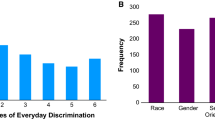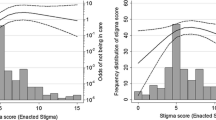Abstract
While it is widely agreed that HIV-related stigma may impede access to treatment and support, there is little evidence describing who is most likely to experience different forms of stigma and discrimination and how these affect disclosure and access to care. This study examined experiences of interpersonal discrimination, internalized stigma, and discrimination at health care facilities among HIV-positive adults aged 18 years and older utilizing health facilities in four countries in Sub-Saharan Africa (N = 536). Prevalence of interpersonal discrimination across all countries was 34.6 %, with women significantly more likely to experience interpersonal discrimination than men. Prevalences of internalized stigma varied across countries, ranging from 9.6 % (Malawi) to 45.0 % (Burkina Faso). Prevalence of health care discrimination was 10.4 % across all countries. In multiple regression analyses, we found positive, significant, and independent associations between disclosure and interpersonal discrimination and disclosure and support group utilization, and positive associations between both internalized stigma and health care discrimination and referral for medications.
Similar content being viewed by others
References
Dlamini PS, Wantland D, Makoae LN, et al. HIV stigma and missed medications in HIV-positive people in five African countries. AIDS Patient Care STDS. 2009;23(5):377–87.
Chesney MA, Smith AW. Critical delays in HIV testing and care. Am Behav Sci. 1999;42(7):1162–74.
Kalichman SC, Simbayi LC. HIV testing attitudes, AIDS stigma, and voluntary HIV counselling and testing in a black township in Cape Town, South Africa. Sex Trans Infect. 2003;79(6):442–7.
World Health Organization, UNAIDS, UNICEF. Toward universal access: scaling up HIV/AIDS interventions in the health sector. Geneva: World Health Organization; 2007.
Link BG, Phelan JC. Conceptualizing stigma. Ann Revi Sociol. 2001;27:363–85.
Mahajan AP, Sayles JN, Patel VA, et al. Stigma in the HIV/AIDS epidemic: a review of the literature and recommendations for the way forward. AIDS. 2008;22(Suppl 2):S67–79.
Holzemer WL, Uys L, Makoae L, et al. A conceptual model of HIV/AIDS stigma from five African countries. J Adv Nurs. 2007;58(6):541–51.
Deacon H. Towards a sustainable theory of health-related stigma: lessons from the HIV/AIDS literature. J Community Appl Soc Psychol. 2006;16(6):418–25.
Visser M, Kershaw T, Makin J, Forsyth B. Development of Parallel Scales to Measure HIV-Related Stigma. AIDS Behav. 2008;12(5):759–71.
Berger BE, Ferrans CE, Lashley FR. Measuring stigma in people with HIV: psychometric assessment of the HIV stigma scale. Res Nurs Health. 2001;24(6):518–29.
Bunn JY, Solomon SE, Miller C, Forehand R. Measurement of stigma in people with HIV: a reexamination of the HIV Stigma Scale. AIDS Educ Prev. 2007;19(3):198–208.
Kang E, Rapkin BD, Remien RH, Mellins CA, Oh A. Multiple dimensions of HIV stigma and psychological distress among Asians and Pacific Islanders living with HIV illness. AIDS Behav. 2005;9(2):145–54.
Fife BL, Wright ER. The dimensionality of stigma: a comparison of its impact on the self of persons with HIV/AIDS and cancer. J Health Soc Behav. 2000;41(1):50–67.
Li X, Wang H, Williams A, He G. Stigma reported by people living with HIV in south central China. J Assoc Nurs AIDS Care. 2009;20(1):22–30.
Simbayi LC, Kalichman S, Strebel A, Cloete A, Henda N, Mqeketo A. Internalized stigma, discrimination, and depression among men and women living with HIV/AIDS in Cape Town. S Afr Soc Sci Med. 2007;64(9):1823–31.
Yebei VN, Fortenberry JD, Ayuku DO. Felt stigma among people living with HIV/AIDS in rural and urban Kenya. Afr Health Sci. 2008;8(2):97–102.
Hong KT, Anh N, Ogden J. Understanding HIV and AIDS-related stigma and discrimination in Vietnam. Washington, DC: International Center for Research on Women; 2004.
Kinsler JJ, Wong MD, Sayles JN, Davis C, Cunningham WE. The effect of perceived stigma from a health care provider on access to care among a low-income HIV-positive population. AIDS Patient Care STDS. 2007;21(8):584–92.
Schuster MA, Collins R, Cunningham WE, et al. Perceived discrimination in clinical care in a nationally representative sample of HIV-infected adults receiving health care. J Gen Intern Med. 2005;20(9):807–13.
Serovich JM. A test of two HIV disclosure theories. AIDS Educ Prev. 2001;13(4):355.
Kalichman SC, DiMarco M, Austin J, Luke W, DiFonzo K. Stress, social support, and HIV-status disclosure to family and friends among HIV-positive men and women. J Behav Med. 2003;26(4):315–32.
Medley A, Garcia-Moreno C, McGill S, Maman S. Rates, barriers and outcomes of HIV serostatus disclosure among women in developing countries: implications for prevention of mother-to-child transmission programmes. Bull World Health Organ. 2004;82(4):299–307.
Obermeyer CM, Baijal P, Pegurri E. Facilitating HIV disclosure across diverse settings: a review. Am J Public Health. 2011;101(6):1011.
Vanable PA, Carey MP, Blair DC, Littlewood RA. Impact of HIV-related stigma on health behaviors and psychological adjustment among HIV-positive men and women. AIDS Behav. 2006;10(5):473–82.
Clark HJ, Lindner G, Armistead L, Austin B-J. Stigma, disclosure, and psychological functioning among HIV-infected and non-infected African-American women. Women Health. 2004;38(4):57–71.
Preston DB, D’Augelli AR, Kassab CD, Cain RE, Schulze FW, Starks MT. The influence of stigma on the sexual risk behavior of rural men who have sex with men. AIDS Educ Prev. 2004;16(4):291–303.
Rintamaki LS, Davis TC, Skripkauskas S, Bennett CL, Wolf MS. Social stigma concerns and HIV medication adherence. AIDS Patient Care STD. 2006;20(5):359–68.
Smith R, Rossetto K, Peterson BL. A meta-analysis of disclosure of one’s HIV-positive status, stigma and social support. AIDS Care. 2008;20(10):1266–75.
Obermeyer CM, Neuman M, Desclaux A, et al. Associations between mode of HIV testing and consent, confidentiality, and referral: a comparative analysis in four african countries. PLoS Med. 2012;9(10):e1001329. doi:10.1371/journal.pmed.1001329.
Nyblade L, MacQuarrie K. Can we measure HIV/AIDS-related stigma and discrimination. Current knowledge about quantifying stigma in developing countries. Washington DC: United States Agency for International Development; 2006.
Pulerwitz J, Michaelis A, Weiss E, Brown L, Mahendra V. Reducing HIV-related stigma: lessons learned from Horizons research and programs. Public Health Rep. 2010;125(2):272.
Obermeyer C, Bott S, Carrieri P, et al. HIV testing, treatment, and prevention: Generic tools for operational research. Geneva: World Health Organization; 2009.
DeVellis RF. Scale development : theory and applications. Newbury Park: Sage; 1991.
Zou G. A modified Poisson regression approach to prospective studies with binary data. Am J Epidemiol. 2004;159(7):702.
StataCorp. Stata 10.1 SE. College Station: StataCorp LP; 2007.
Gielen AC, McDonnell KA, Burke JG, O’Campo P. Women’s Lives After an HIV-Positive Diagnosis: disclosure and Violence. Matern Child Health J. 2000;4(2):111–20.
Maman S, Abler L, Parker L, et al. A comparison of HIV stigma and discrimination in five international sites: the influence of care and treatment resources in high prevalence settings. Soc Sci Med. 2009;68(12):2271–8.
Castro A, Farmer P. Understanding and addressing AIDS-related stigma: from anthropological theory to clinical practice in Haiti. Am J Public Health. 2005;95(1):53–9.
Genberg BL, Hlavka Z, Konda KA, et al. A comparison of HIV/AIDS-related stigma in four countries: negative attitudes and perceived acts of discrimination towards people living with HIV/AIDS. Soc Sci Med. 2009;68(12):2279–87.
Zukoski AP, Thorburn S. Experiences of stigma and discrimination among adults living with HIV in a low HIV-prevalence context: a qualitative analysis. AIDS Patient Care STD. 2009;23(4):267–76.
Smith KP, Watkins SC. Perceptions of risk and strategies for prevention: responses to HIV/AIDS in rural Malawi. Soc Sci Med. 2005;60(3):649–60.
Owolabi RS, Araoye MO, Osagbemi GK, Odeigah L, Ogundiran A, Hussain NA. Assessment of stigma and discrimination experienced by people living with HIV and AIDS receiving care/treatment in University of Ilorin Teaching Hospital (UITH), Ilorin, Nigeria. J Intern Assoc Phys AIDS Care (JIAPAC). 2011;11(2):121–7.
Gielen AC, Fogarty L, O’Campo P, Anderson J, Keller J, Faden R. Women living with HIV: disclosure, violence, and social support. J Urban Health. 2000;77(3):480–91.
Obermeyer CM, Sankara A, Bastien V, Parsons M. Gender and HIV testing in Burkina Faso: an exploratory study. Soc Sci Med. 2009;69(6):877–84.
Makoae LN, Greeff M, Phetlhu RD, et al. Coping with HIV-related stigma in five African countries. J Assoc Nurs AIDS Care. 2008;19(2):137–46.
Meyer IH. Prejudice as stress: conceptual and measurement problems. J Info. 2003;93(2):262–5.
Ogden J, Nyblade L. Common at its core: HIV-related stigma across contexts. Washington DC: International Center for Research on Women; 2005.
Acknowledgments
The project was supported by a Grant from the National Institutes of Health, 5 R01 HD053268-05, to Carla Makhlouf Obermeyer (CMO). The funders had no role in study design, data collection and analysis, decision to publish, or preparation of the manuscript. All authors had full access to all the data and can take responsibility for the integrity of the data and the accuracy of the data analysis.
Conflict of interest
No conflicts of interest are declared for any of the authors. At the time that the project was conducted, Carla Makhlouf Obermeyer was a Scientist at the World Health Organization (WHO), and the project benefitted from discussions of policies and programs related to testing and counseling around the world, but the WHO did not define the project or influence data collection, analysis or interpretation.
Author information
Authors and Affiliations
Consortia
Corresponding author
Additional information
The members of the MATCH study group are given in Appendix.
Appendix
Appendix
The members of the MATCH study group are:
Peter Cherutich (National AIDS Control Program, Nairobi, Kenya).
Alice Desclaux (Unité Mixte Internationale 233 TRANSVIHMI, Institut de Recherche pour le Développement, Dakar, Sénégal).
Anita Hardon (University of Amsterdam, Amsterdam, The Netherlands).
Odette Ky-Zerbo (Programme d’Appui au Monde Associatif et Communautaire, Ouagadougou, Burkina Faso).
Ireen Namakhoma (Reach Trust, Lilongwe, Malawi).
Rhoda Wanyenze (Makerere University School of Public Health, Kampala, Uganda).
Rights and permissions
About this article
Cite this article
Neuman, M., Obermeyer, C.M. & The MATCH Study Group. Experiences of Stigma, Discrimination, Care and Support Among People Living with HIV: A Four Country Study. AIDS Behav 17, 1796–1808 (2013). https://doi.org/10.1007/s10461-013-0432-1
Published:
Issue Date:
DOI: https://doi.org/10.1007/s10461-013-0432-1




